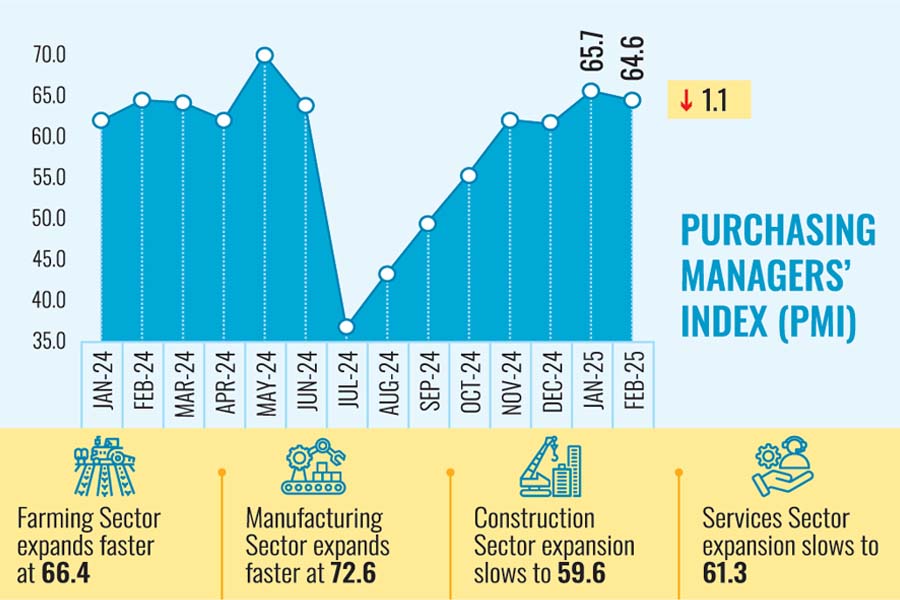
Published :
Updated :

The February reading of the Bangladesh Purchasing Managers' Index (PMI) declined by 1.1 points from the previous month to record a slower expansion rate at 64.6, according to a press release issued on Sunday.
This latest reading is attributed to slower rates of expansion posted by the construction and services sectors, while the agriculture and manufacturing sectors posted faster expansion rates.
Under PMI, an economic indicator tracking directions of an economy, a reading above 50 indicates that the sector/ economy is generally 'expanding'. A reading of 50 indicates 'no change' compared to last month, while a reading below 50 indicates a 'contraction'.
The agriculture sector posted a fifth month of expansion and at faster rates. The sector posted a faster expansion rate for the indexes of new business, business activity, input costs, and order backlogs. The employment index posted a slower contraction.
The manufacturing sector posted a sixth month of expansion and at faster rates. The sector posted faster expansion readings for the indexes of new orders, factory output, input purchases, and supplier deliveries. Slower expansion rates were recorded for the indexes of new exports, finished goods, imports, and employment. The order backlogs index posted a faster contraction rate.
The construction sector posted a third month of expansion and at slower rates. The sector posted slower expansion readings for the indexes of new business and construction activity, whereas the input costs index posted a faster expansion rate. The employment index reverted to an expansion, and the order backlogs index posted a slower contraction rate.
The services sector posted a fifth month of expansion and at a slower rate. The sector posted a slower expansion rate for the indexes of new business, business activity, and employment. The order backlogs index reverted to a contraction, and the input costs index posted a faster expansion rate.
"Bangladesh's PMI readings indicate sustained expansion for the fifth month, driven by continued growth in exports and seasonal uptick in agriculture, while construction and services recorded slower expansion," said M. Masrur Reaz, Chairman and CEO of Policy Exchange Bangladesh.
"Business confidence remains weak due to sluggish demand, energy disruptions and continued protests. Sustained recovery depends on improved law and order, political consensus on election roadmap, and expedited implementation of priority reforms."
The Bangladesh PMI was developed in 2024 by Metropolitan Chamber of Commerce and Industry (MCCI) and Policy Exchange Bangladesh, in cooperation with the Singapore Institute of Purchasing and Materials Management (SIPMM) and supported by UK International Development.
The Bangladesh PMI was initiated by the UK government. Covering the key economic sectors, the Bangladesh PMI is based on data compiled from monthly surveys of over 500 private sector enterprises.
Survey responses reflect the change in business activity, if any, in the current month compared to the previous month. The headline numbers are derived using 'diffusion index' methodology, aggregating inputs from these companies on various indicators, weighted.
The methodology was developed by SIPMM, with technical inputs from Policy Exchange.
jasimharoon@yahoo.com


 For all latest news, follow The Financial Express Google News channel.
For all latest news, follow The Financial Express Google News channel.